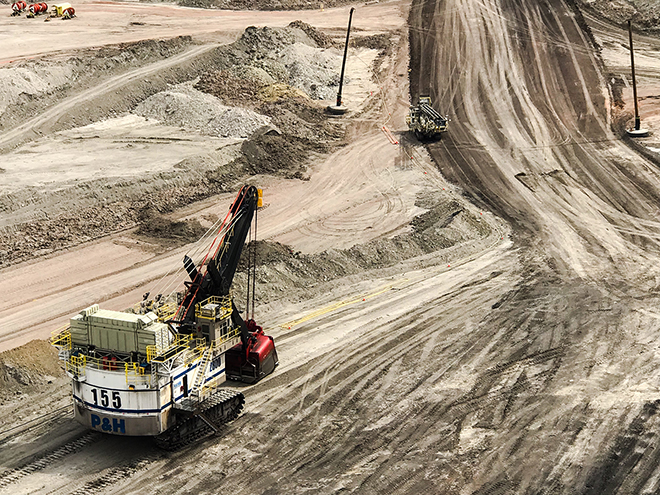
Peabody Energy's North Antelope Rochelle mine in the Powder River Basin is the largest coal mine in the United States and supplies dozens of U.S. power plants with thermal coal. |
Weak demand exacerbated by the global COVID-19 pandemic is putting pressure on U.S. coal mining companies that doled out cash to shareholders prior to the outbreak.
Two of the country's largest coal producers, Peabody Energy Corp. and Arch Resources Inc., have spent $2.17 billion on share buybacks since 2016, favoring such spending to saving the cash, paying down more debt or investing in additional capital projects. While the sector saw profitability improve after companies began emerging from bankruptcy restructurings with significantly lower debt, a temporary improvement in export markets was already waning in the months ahead of the pandemic.
U.S. coal and coal-related rated companies generated about $10 billion of cash flow from mining operations between 2017 and 2019, according to a Moody's Investors Service report published in July. More than half of that operating cash flow went to shareholder return programs, including about $3 billion to regular and special dividends.
Moody's flagged the trend of coal companies flowing cash back to shareholders as a growing risk that limited credit quality improvement despite improved market conditions in 2018. At the end of 2019, the amount of cash that coal companies returned to shareholders exceeded the industry's rated debt at the end of 2019, Moody's wrote in July 2020.
"Some of these companies could have entered this crisis with no debt," Benjamin Nelson, a senior credit officer and lead coal analyst with Moody's, said in an interview. "We said, look, this is an industry that's generating a lot of cash. Rather than shoring up for the next downturn, what they're doing with the cash is giving it all away to shareholders."
Because of the COVID-19 outbreak, the market upheaval came faster than many were expecting, Nelson added.
"For some of these companies, this is very clearly a self-inflicted issue," Nelson said. "Not to say you could predict when COVID would occur and the damage that it would inflict, but eventually in the commodity industry, there are downturns."
In a November 2019 note to investors, Seaport Global Securities LLC analyst Mark Levin called on the sector to "hoard cash" and deleverage their balance sheets heading into 2020.
"With future capital market access uncertain at best, we think it's prudent for boards to act now rather than wait," Levin wrote. "Cash will be king."
The primary beneficiaries of recent shareholder return programs in the coal sector are a handful of investors, mainly hedge funds and other institutional investors that now own a large share of the recently restructured producers.
S&P Global Market Intelligence's public ownership data shows that 18 institutional investors hold about 81.9% of Peabody's common shares outstanding. Activist investor Elliot Management Corp., which recently received positions on Peabody's board of directors, owns 29.6% of the company's shares.
A recent securities filing shows that Peabody spent about $1.34 billion of the $1.5 billion authorized under its share repurchasing program. Similarly, Arch has spent about $827.4 million on share repurchases as part of the $1.05 billion allocated to its buyback program.
However, some are questioning the sector's strategy of leaning in to buybacks.
"You guys spent a bunch of money on buying back equity a while back," Matthew Vittorioso, a managing director at Jefferies, said while on an earnings call with Peabody executives Aug. 5. "To the extent that your lenders are getting on this call asking you legitimate questions about how you're maneuvering assets and what you're going to do with your cash, I think a little bit more transparency would be appreciated, just given that you didn't need to be in this tight spot."
Peabody Energy Vice President of Investor Relations and Communications Julie Gates said on the call that the market landscape has "changed considerably and drastically" in the last six months. Gates said Peabody is taking multiple steps to adapt, including eliminating jobs and executing a cost repositioning program.
"No doubt about it, cash preservation remains key here, but we believe we're doing what we need to do," Gates said in response to Vittorioso. Peabody declined an emailed request to provide further comments related to the topic. According to a quarterly filing with the SEC, the company suspended share repurchases in late 2019 and does not have plans to repurchase shares.
Peabody ended the second quarter with $926 million of liquidity, a $262 million reduction from March 31. The company also saw the availability under its accounts receivable securitization facility decline and is now "undertaking a process to evaluate various strategic financing alternatives."
Though Arch continues to devote capital to its new Leer South metallurgical coal mining project in West Virginia, it has also put the brakes on share repurchases and its quarterly dividend in the wake of the COVID-19 pandemic. Arch forecast that its liquidity will remain below preferred levels as the crisis continues.
"Quite frankly, that's how the board always envisioned the program working. When excess cash flows are high, and needs are modest, we return capital via buybacks," Arch CFO John Drexler said on a February earnings call. "Conversely, when excess cash flows are reduced, the amount of capital available for share repurchases is reduced as well."



